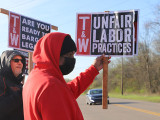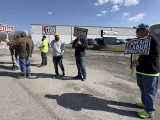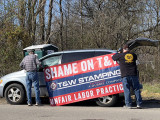Honestly, we’re looking for very little here.
Reed Adams stands his ground on the picket line to protest unfair labor practices by T&W Stamping.
View Photo Gallery (7 photos)
A Boilermakers union strike at T&W Stamping in Austintown, Ohio, has passed the five-week mark with the employer finally talking with the union about the possibility of getting back to the table, with union’s expectation that the bargaining will be in good faith.
Local 1622 had been attempting to renegotiate a contract since November 2023, after the previous contract expired. On March 25, the union went on strike after filing unfair labor practice charges with the National Labor Relations Board against T&W, protesting illegal actions by their employer.
Specifically, the union is citing regressive action and implementation charges. Regressive action means the company has removed one or more economic proposals it had previously offered across the table—essentially reversing the bargaining progress. The implementation charge refers to T&W prematurely implementing a part of the company’s economic proposals prior to both parties reaching either impasse or agreement in the bargaining process. Both charges are violations of good faith bargaining standards.
“If you want a job, come back in by 9 a.m., otherwise, have a nice life,” T&W company president Jessy Vandygriff told the workers outside as the strike commenced. He then gave incorrect information about striking.
Among the stalemate issues at the bargaining table were seniority policies and raises. Many T&W workers are longtime employees, and none have received an hourly raise in nearly four years—even despite working through the pandemic to keep up with orders, and even as orders later increased while T&W shrunk its workforce down to 25, placing greater demand on the remaining employees.
They’re neighbors, husbands and dads. They have kids and rent and mortgages and everyday bills. They're real people. And they just want to get back to the bargaining table in good faith—so they can get back to work. Meet the L-1622 Boilermakers.
“We’re not asking for the moon. This place wasn’t always profitable, and we helped make it profitable,” said Bob Silman, who has worked for the company for 14 years.
L-1622 president Nick Dewell said Vandygriff made his stance clear when workers asked for a raise and he responded: “I won’t give you another raise until the day I die. It will be over my dead body.”
“When I tried to reason and told him I’d been working there for 20 years and wasn’t making $20/hour, he told me maybe it was time for me to start a new chapter in my life somewhere else,” said Dewell.
According to the Bureau of Labor Statistics 2022 data (the most recent stats available specific to the area), the average hourly wage for production work in the greater Youngstown, Ohio, area is $20.15/hour—already significantly lower than the 2022 national average of $21.81/hour. Workers at T&W average just $18/hour. Most start at $16 and top out at $19, according to Dewell.
The union asked at the bargaining table for a $1.00/hour raise, and after saying “no,” the company prematurely implemented a 25-cent raise instead.
“A lot of us thought coming into this contract that they were going to give us something,” said Reed Adams, a TIG welder who has worked for T&W for a decade. “I don’t understand why that man would only offer a quarter hourly raise. A quarter! What is a quarter? He can’t even take care of his family on a quarter hourly raise—and we haven’t had a raise in four years. That’s kind of like a slap in the face.”
Meanwhile, multiple workers said that at the annual T&W Christmas party, the company regularly reports millions in annual profits, bragging recently about making at least $16 million in profits.
Adding further proverbial insult to injury, the company initiated a perfect attendance “bonus” policy. Those who miss no days of work outside of paid holidays and approved vacation days receive a maximum year-end bonus. They receive $100 per week for perfect attendance, with an extra $600 at the end of each quarter if they achieve 100% perfect weeks—meaning a potential $1,800 bonus per quarter.
But, workers lose these bonuses if they miss a single day of work for any reason—including sickness, funerals and even jury duty. In order for their absences to be excused, an employee’s only option is to use vacation days, and they must be scheduled 30 days in advance of the date they intend to use them. No exceptions.
Chuck Schisler, who has worked for the company nine years, experienced exactly what “no exceptions” meant when his grandfather unexpectedly died. Schisler had properly requested and been approved for an upcoming vacation day when he learned of his grandfather’s sudden death. When he asked if he could circumvent the 30-day vacation notice policy and swap the vacation day to take place at a slightly different date—so he could attend the funeral in place of the vacation he'd planned—he was told a flat “no” by Vandygriff and that “Perfect attendance is perfect attendance, and rules are rules.”
It cost Schisler $600 to attend his grandfather’s funeral.
“I hope [Vandygriff] sees how ridiculous this all is and that there are good guys out here,” Schisler said. “He’s being stubborn for no reason. It’s not right. If it wasn’t for this group of guys, I might go look for something else. Honestly, we’re looking for very little here.”
Most on the picket line noted the brother-like relationship among workers and pointed to their camaraderie translating to the quality work they produce. Not only do they work well in sync as a team, but their positive relationships mean longevity on the job, helping them to know the machinery and ins and outs of their roles.
This is especially important, knowing what the workers produce. T&W makes the aluminum oil pans for semi-trailers and airplanes. Several of the striking workers noted that T&W is churning through temporary workers to fill orders. With the company’s history of not training new employees well and verbally abusing workers, new hires don’t stay long, they said. According to Adams and T.J. King, another welder who has worked for T&W for 10 years, the company accountant is doing their welding job.
On the picket line, L-1622 watches the temporary workers come and go, and they are keenly aware of the silence left when the presses and other machines inside T&W are halted.
“We all deserve a raise, because we do a good, quality job and get their product out,” said Tony Rozzi. “We all know our jobs, and it’s not a bad place to work.”
In fact, despite the conditions that brought L-1622 to strike, most of the striking Boilermakers say what they really want is to get back to work. They want Vandygriff to rejoin them at the bargaining table and bargain in good faith.
“For the past ten years [this job] has been everything,” said King. “This was my home, and I love these guys. After ten years, we’ve built great relationships. We’re like family.”
Added Sean McCollum, L-1622’s acting chairman of trustees and a nine-year employee:
“I have two little ones at home, and I’m trying to show them that you’ve got to stand for something… We have families. We have goals we want to reach. My kids know I go to work and I work hard, and I want to be able to show them, ‘Look what real hard work does when you put your time in.’
“I just want to be able to get back in and make more money. People are tired and we need to make a stand. We need to be compensated for what we’re doing. If I could say one thing to Jessy: Just please sit down and talk to us. Just get us back inside so we can work. Please.”
For the latest information and to add your name in solidarity with Local 1622, visit www.standwith1622.org.












